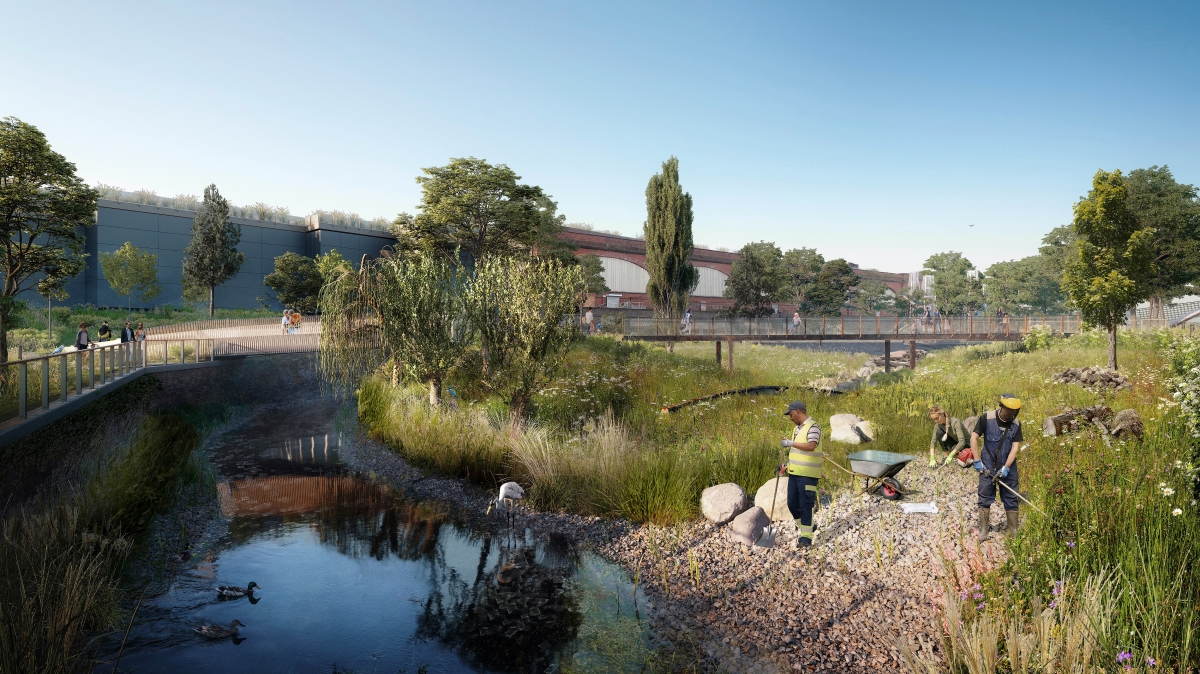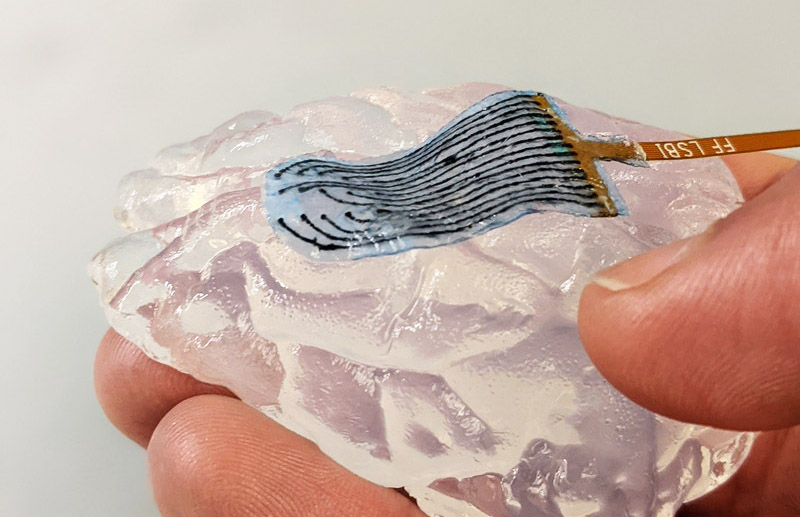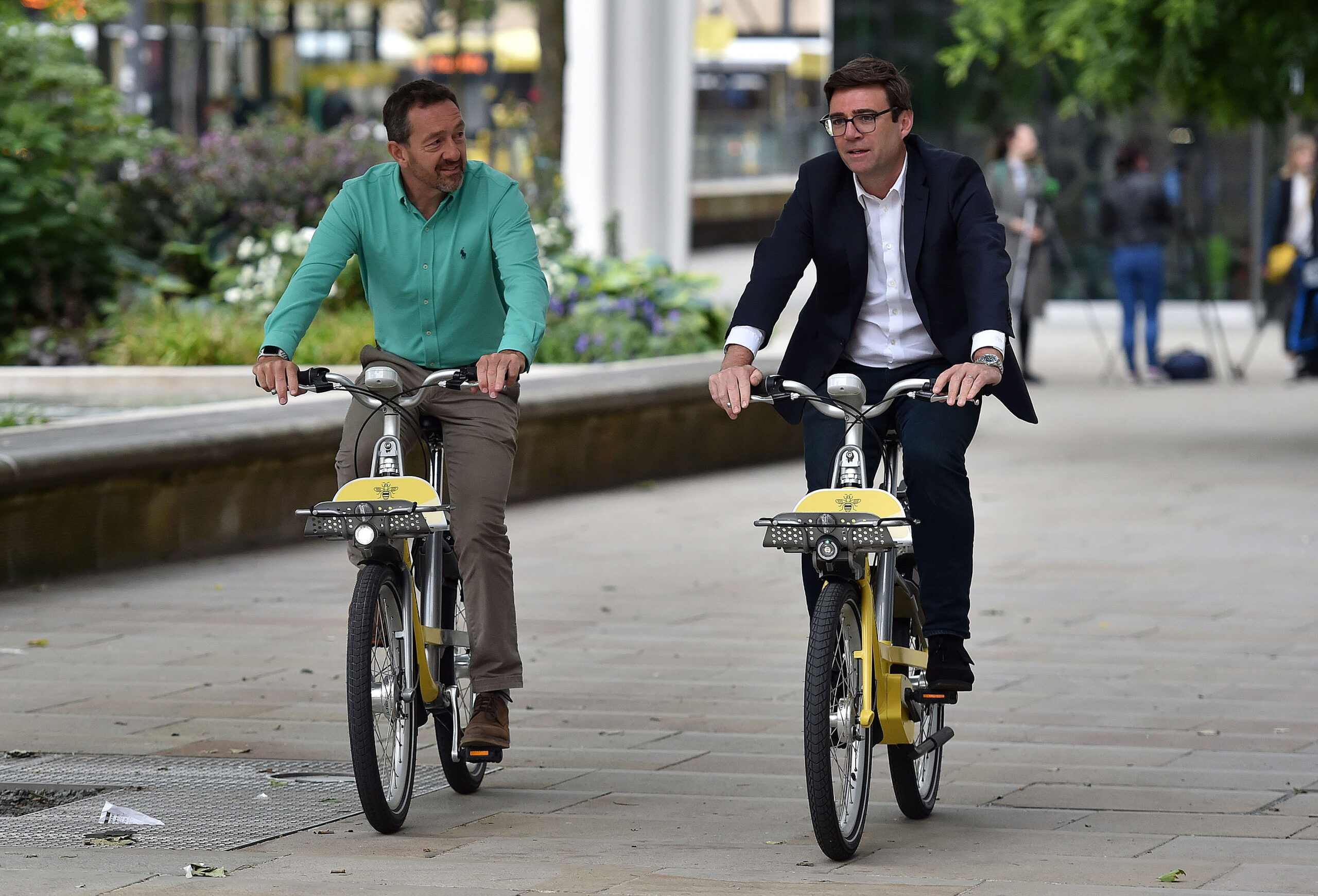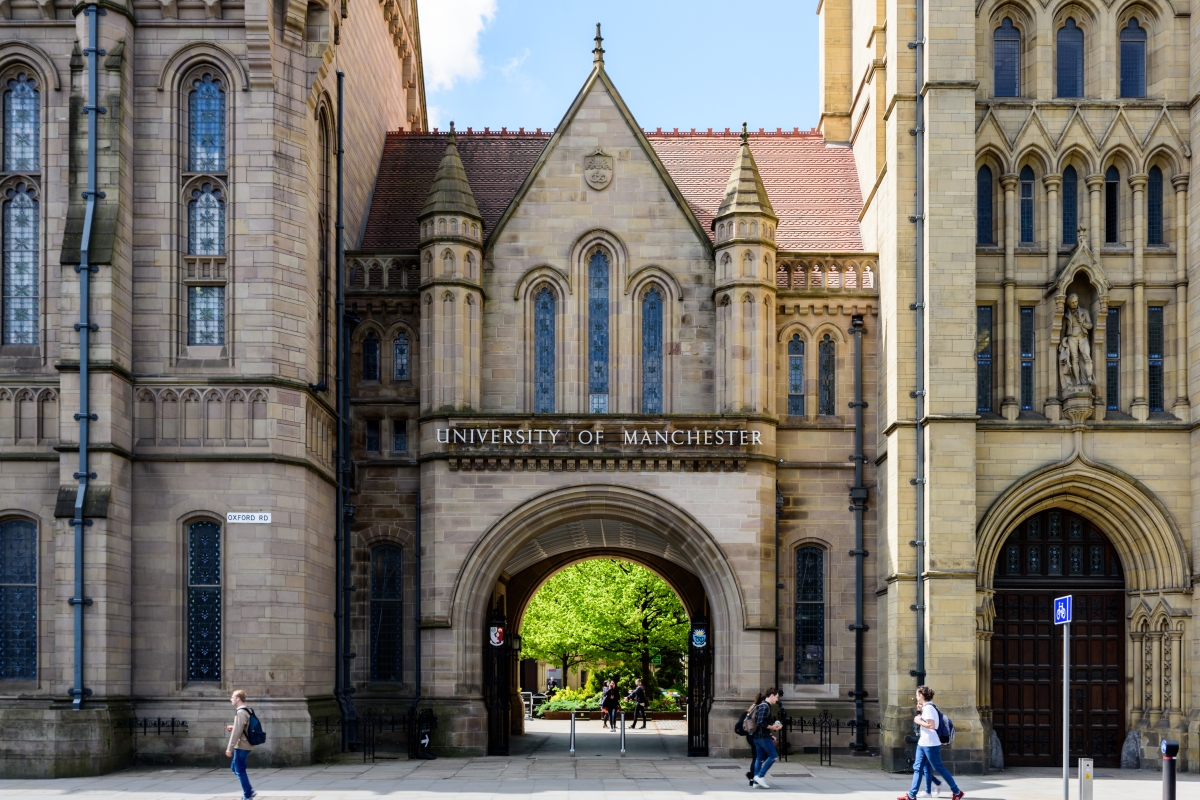Insights
Rediscovered Victorian brewery wells to provide Manchester’s new Mayfield Park with sustainable irrigation
Irrigation scheme will support delivery of 24-acre ‘shovel ready site’ identified by GM LEP and GMCA for funding from Government’s Getting Building Fund, supporting Economic Vision’s ambitions for green growth
The developers behind Manchester’s first new public park in 100 years will use water from recently rediscovered Victorian wells as a sustainable source of irrigation.
The construction team delivering Mayfield Park located 12 wells across the 24-acre site.
While many were backfilled or damaged, and have been permanently capped, three wells – the largest of which was used to supply the former Britannia Brewery which was based on the east of the site in the late 19th and early 20th Century – will be reused.
Mayfield Park was one of seven projects in Greater Manchester to receive a share of £54.2m from the UK Government’s Getting Building Fund.
Projects were chosen that would support the Greater Manchester Local Industrial Strategy agreed with Government by the Greater Manchester Combined Authority and GM LEP in 2019.
The Government pledged £23m of investment from its Getting Building Fund – one of the largest investments in any single project – to Mayfield Park.
This investment, delivered through the GMCA, is part of the Government’s strategy to support ‘shovel ready’ schemes that will help to drive economic recovery following the COVID-19 crisis.
The long-term proposals at Mayfield will seek to enhance many of the site’s historic features. The vast depot building beneath the station building has already been transformed into a new cultural venue, Depot Mayfield, which contributed to bringing 330,000 visitors to Mayfield in 2019, after more than 30 years of decline.
Overall, the Mayfield regeneration scheme – one of the largest in the UK – is set to transform a previously derelict part of Manchester’s industrial heritage to deliver 1,500 homes, 1.6m sq ft of market-leading commercial space, 300,000 sq ft of retail and leisure facilities and 14 acres of the new public realm.
The well water has been subject to stringent tests and declared safe for irrigation use.
This means that 20 cubic metres of water per day can be pumped from the wells to keep the park’s hundreds of trees and plants lush and thriving, reducing the burden on the mains supply and providing significant sustainability benefits.
Established in the 1830s, the Britannia Brewery was described in 1888 by the Manchester Courier and Lancashire General Advertiser as “one of the most important in Lancashire” and was able to produce more than 300 barrels of beer a week.
The plan to reuse the wells is the latest step taken by the Mayfield Partnership – the public-private venture led by U+I – to incorporate Mayfield’s rich history into its new lease of life.
The wells were discovered while archaeologists were on-site cataloguing the historic features of the Mayfield site, which sits adjacent to Piccadilly Station.
They are among several important discoveries made at Mayfield as work on the transformational £1.4bn regeneration scheme gains momentum.
Arlene Van Bosch, development director at U&I said:
“In forming our plans for Mayfield we’ve taken inspiration from the ingenuity that made the area a hive of activity during the industrial revolution. So, it’s entirely fitting that we’re now able to find new uses for some of the historical assets we’ve discovered as we create a stunning new public amenity at Mayfield Park.
“Although Manchester of course does not have any shortage of water, it makes both economic and environmental sense for us to use this amazing natural resource beneath our feet, which clearly further connects us to Mayfield’s industrial past.”
Achieving green economic growth is a key focus for the Greater Manchester Economic Vision.

New Mayfield Park (Image Credit: Mayfield Partnership)
Harvard and Manchester pioneer ‘soft’ graphene-containing electrodes that adapt to living tissue
Researchers from The University of Manchester and Harvard University have collaborated on a pioneering project in bioengineering, producing metal-free, hydrogel electrodes that flex to fit the complex shapes inside the human body.
Opening new possibilities for treating brain injuries and other conditions, the research demonstrates the global impact of advanced materials innovation in Greater Manchester.
Advanced materials and health innovation are among Greater Manchester’s frontier sector strengths, as outlined within the Greater Manchester Economic Vision and Greater Manchester Local Industrial Strategy.
The study, led by Harvard’s Wyss Institute for Biologically Inspired Engineering in collaboration with the Laboratory of Soft Biolectronic Interfaces at EPFL in Lausanne and Manchester’s National Graphene Institute (NGI), mixed carbon nanotubes with a water-based, defect-free solution of graphene, originally developed at the NGI by a team led by Professor Cinzia Casiraghi.
Electrodes are frequently used in medicine to monitor or deliver electrical impulses inside and outside the human body, however performance is currently limited by the rigidity of devices that do not match the soft springiness of living tissue, a property known as viscoelasticity. Electrodes may detach under movement or require greater current to affect their intended target because their shape does not fit precisely to the host site.
The key, according to lead authors Ms Christina Tringides and Professor David Mooney from Harvard, was a hydrogel that could mimic the viscoelasticity of tissue, alongside a conductive ink that could also perform well under flexion.
Tringides and Mooney, in collaboration with the Nanomedicine Lab in Manchester, identified a mixture of graphene flakes and carbon nanotubes as the best conductive filler, replacing the use of traditional rigid metals.
“Part of the advantage of these materials is their long and narrow shape,” explained Tringides. “It’s a bit like throwing a box of uncooked spaghetti on the floor – because the noodles are all long and thin, they’re likely to cross each other at multiple points. If you throw something shorter and rounder on the floor, like rice, many of the grains won’t touch at all.”
While the carbon nanotubes used are commercially available, the graphene flake suspension is a process patented by The University of Manchester, currently exploited for printed electronics and biomedical applications. This work demonstrated that you need both materials to achieve optimal electrode performance – carbon nanotubes or graphene alone would not suffice.
Cinzia Casiraghi, Professor of Nanoscience from the NGI and Department of Chemistry at Manchester, said:
“This work demonstrates that high-quality graphene dispersions – made in water by a simple process based on a molecule that one can buy from any chemical supply – have strong potential in bioelectronics. We are very interested in exploiting our graphene (and other 2D materials) inks in this field.”
Kostas Kostarelos, Professor of Nanomedicine and leader of the Nanomedicine Lab, added:
“This truly collaborative effort between three institutions is a step forward in the development of softer, more adaptable and electroactive devices, where traditional technologies based on bulk and rigid materials cannot be applied to soft tissues such as the brain.”
This research in Manchester was supported by the EPSRC Programme Grant 2D Health and the International Centre-to-Centre grant with Harvard. Other funders include the: National Science Foundation, National Institutes of Health, Wyss Institute for Biologically Inspired Engineering at Harvard University, National Institute of Dental & Craniofacial Research, Eunice Kennedy Shriver National Institute of Child Health & Human Development, Bertarelli Foundation, Wyss Center Geneva, and SNSF Sinergia.
Advanced materials is one of The University of Manchester’s research beacons – examples of pioneering discoveries, interdisciplinary collaboration and cross-sector partnerships that are tackling some of the biggest questions facing the planet.
A version of this article was originally published on the University of Manchester website.

Hydrogel-electrodes (Image credit: Wyss Institute at Harvard University)
SatixFy set to join European Space Agency launch mission
Satellite communications equipment from a space technology company based in Stockport, Greater Manchester, is set to be tested in orbit after being delivered on board the SpaceX rocket.
SatixFy Space Systems will use the European Space Agency mission to demonstrate their satcom technology in space for the first time.
SatixFy’s CubeSat computer will be the most capable product of its type on the market, supporting up to 4Gbps of data transmission, and allowing companies to process large amounts of data in orbit.
SatixFy’s satcom technology will be part of a payload to launch aboard a SpaceX Falcon 9 rocket from NASA’s Kennedy Space Center in Florida. The launch was originally due to take place in June but was postponed.
Elodie Viau, Director of Telecommunications and Integrated Applications at ESA, said:
“ESA is proud to enable small and medium-sized enterprises in Europe to become space mission providers and enter the space industry through programmes such as Pioneer.
“It provides innovators and entrepreneurs with the means to access space through cost-effective processes, creating jobs and boosting prosperity, and supporting the success of the European and Canadian space industry in the highly competitive global telecommunications market.”
SatixFy Space Systems has a base on the Cheadle Royal Business Park, Stockport, Greater Manchester.

Joint venture to test new treatments in clinical and digital health
The University of Manchester, together with Health Innovation Manchester and its Academic Health Science Centre, are launching a joint venture with the Morningside Group to trial a series of new diagnostics and interventions in clinical and digital health.
The venture will look at novel digital health innovations and trial a range of cost-effective diagnostic and therapeutic interventions developed by the Morningside Group, with a focus on the prevention and early detection of disease.
A key focus will be the use of digital technologies to transform the nature of services for patients. Developing solutions away from the hospital environment has the potential to empower patients, drive proactive care, reduce the cost of treatment and transform population health outcomes.
Greater Manchester’s track record in clinical trials, combined with its diverse population, high burden of illness, distinctive health ecosystem, digital maturity and devolved health and social care budget, makes it an ideal location for pioneering new treatments.
Combined with clinical expertise within Manchester University NHS Foundation Trust and Salford Royal NHS Foundation Trust, and wider capabilities for innovation deployment at scale through Health Innovation Manchester, the partnership is uniquely positioned to trial and deliver benefits from innovations that emerge from the Morningside Group’s portfolio of companies.
The partnership also forms the next step in an ambitious plan at The University of Manchester to bolster digital health capabilities in the region, following January’s launch of the multimillion-pound Christabel Pankhurst Institute for Health Technology and Innovation.
Morningside co-founder and Honorary Professor of Translational Medicine at The University of Manchester Dr Gerald Chan said:
“Morningside’s long-standing ambition is to create positive change in the world of public health. Through our diverse portfolio of companies, we are proud to have made significant contributions to the life sciences, including biotech companies, developing water filtration membranes, cancer targeting systems and a mobile app for the early detection of autism among others. Now, we are excited to be partnering with The University of Manchester to leverage our combined strengths in digital health and innovation and create effective and affordable health solutions that benefit the public.”
Professor Graham Lord, Vice-President and Dean of the Faculty of Biology, Medicine and Health at The University of Manchester said:
“At Manchester, our primary focus has always been on delivering bench-to-bedside research. This exciting partnership will help drive innovation across Greater Manchester and beyond, ensuring that more patients benefit from the latest cutting-edge treatments and therapies.”
The University’s President and Vice-Chancellor, Dame Nancy Rothwell, said:
“We are proud to be joining forces with Morningside to create unprecedented opportunities in public health solutions. Manchester’s renowned strength in relevant disciplines, including digital, fundamental science, innovation, AI, computational and physical sciences, creates a natural synergy with the capabilities and ambitions of Morningside. This new partnership goes to the heart of what Manchester is about: drawing on our breadth of excellence in fundamental science to drive real-world breakthroughs that benefit society.”
Rowena Burns, Chair of Health Innovation Manchester said:
“Digital health and innovation have a pronounced role to play in the future health of our communities, and the partnership between The University of Manchester and Morningside presents exciting opportunities to boost the long-term health benefits of the city-region through Health Innovation Manchester, while also contributing to business growth and employment. Manchester is a formidable presence on the world stage, with a unique health landscape that lends itself to developing bold new solutions that can then be scaled up to benefit communities both nationally and across the globe. I am excited about Manchester’s pronounced role in spearheading new treatments and innovations that will promote the health, wellbeing and resilience of our nation.”
Find out more about Greater Manchester’s capabilities in delivering health and social care innovation here.

Greater Manchester publishes Clean Air Plan, kickstarting “green revolution” with over £120 million secured to support businesses with vehicle upgrades
Greater Manchester has published its final clean air plan to kick-start the city region’s green revolution, helping to tackle the problem of air pollution, which contributes towards at least 1,200 deaths per year in the city-region.
Greater Manchester has secured over £120m in government funding to support local businesses upgrade to cleaner, compliant vehicles so they can travel in a GM-wide Clean Air Zone without incurring a daily charge. Applications for funding support will open from November this year. This will be essential to support impacted vehicle owners to upgrade, while facing the economic impact of the COVID-19 pandemic.
In light of feedback following last year’s eight-week consultation on the plans and the impact of COVID-19, particularly on small businesses, GM-registered taxi/private hire owners and LGV owners will be given more time, money and options to upgrade.
This includes temporary exemptions for an additional year (until 31 May 2023) for all hackney and private hire vehicles (PHV) licensed by a GM District. Vans, minibuses, GM-registered coaches and wheelchair-accessible taxis were already exempt from daily charges until 2023.
Following consultation and protracted negotiations with government, GM has increased funding support per vehicle for HGVs, coaches, vans, GM Hackney cabs and PHVs. Vans can now access up to £4.5k towards the replacement of a vehicle – £1k more than initially proposed – and GM Hackney Cabs can get up to £10k. HGVs can now get up to £12k towards replacement, nearly three times more than was initially offered, and coaches are now eligible for £32k.
The city region also today announced that bike-share company Beryl has been selected as the delivery partner to design, install and operate a 24/7, public cycle hire scheme made up of an initial 1,500 bikes and e-bikes at over 200 new cycle hire docking stations across Manchester, Trafford and Salford.
Mayor of Greater Manchester, Andy Burnham, said:
“Greater Manchester were the pioneers of the industrial revolution, now we are leading a green revolution, backed with over £120 million that we’ve secured to hand over to businesses to support making their vehicles compliant.
“We listened hard to what business owners wanted and, as a result, taxi drivers are being given more time, more funding and more options. This is part of our wider commitment to put GM-licensed hackney and private hire drivers first, and to lobby government to give us the powers to ensure that only locally licensed drivers are able to operate here.
“The fact is that air pollution is not a problem that is going to go away on its own. Not only has our plan been directed by national government, we’ve taken this seriously and fought to get a plan which has the right funding support for residents and to protect those most vulnerable as well as our trade and businesses. This plan will also have major health and wellbeing benefits for people living near motorways or major roads as there will be less polluting vehicles and HGVs using them.
“Our Clean Air Zone is only one piece of the jigsaw. We’re also fully integrating our public transport system – the Bee Network – and building the UK’s largest cycling and walking network. Today I am also very pleased to announce that urban bike share company Beryl has been named as our delivery partner for cycle hire, with the first bikes going on the ground later this year. Our cycle hire will be one of the largest docked systems outside London and I cannot wait to use the new bikes myself as a way to get from A to B. We’re making huge strides towards our plans to build back greener and be carbon neutral by 2038.”
Greater Manchester lead for Clean Air, Councillor Andrew Western, said:
“We want Greater Manchester to be a healthy, sustainable and happy place to grow up, get on and get old and we can’t afford to be complacent about this globally significant issue.
“Over the past year, we’ve rightly focused on supporting our people and our businesses through the terrible impacts of the pandemic. As we now look to recover, and after considering the impact of COVID-19, we want to continue helping those most affected, including small businesses and taxi drivers, by giving them more time as we look to build back better and greener with certainty.”
Greater Manchester’s Transport Commissioner, Chris Boardman, added:
“Today is a major milestone for the city-region – not only do we have a solid plan to make vehicles on our roads cleaner, we’ll soon be bringing cycle hire to our streets – providing a healthy, convenient, non-polluting transport option for tens of thousands of people. Together with our plans for hundreds of miles of cycling and walking routes by 2024, we are building a truly world-leading sustainable transport system.”
Beryl CEO, Philip Ellis, who also operates cycle hire schemes in Watford, Hereford, Bournemouth and Norwich, added:
“Greater Manchester has fantastic ambition when it comes to green transport and we’re excited to be bringing our experience in delivering world-class cycle hire. There is huge appetite for this scheme and we can’t wait to see people on our bikes and e-bikes later this year.”
Leaders from all ten GM local authorities will be asked to endorse the city-region’s Clean Air Plan – which includes the launch of a GM-wide Clean Air Zone on 30 May 2022 – at the next Greater Manchester Combined Authority (GMCA) meeting on 25 June 2021. This will be followed by approval by individual councils at their meetings.
The ten GM councils are under direction from government to introduce a category C* charging Clean Air Zone – including commercial and passenger vehicles but not private cars – to secure compliance with nitrogen dioxide (NO2) legal limits on local roads in the shortest possible time, and by 2024 at the latest.
Grants will be available for those who need it most, including private hire vehicles (PHV), coaches, HGVs and vans. There are also more options for replacement and retrofit for hackney carriages, PHVs, minibuses and vans.
A Clean Air GM report, published today, will confirm that while the COVID-19 pandemic led to brief air quality improvements, modelling shows it is not expected to lead to long-term reductions in roadside pollution without implementing a Clean Air Zone.
National government provided a funding award of £14.7m to retrofit buses running services in GM that have older engines and don’t meet the Clean Air Zone’s emission standard.
Around 18 bus operators have so far submitted applications for retrofit funding of 750 buses, worth nearly £12m. The retrofitting has now started, with seven operators having started retrofitting their vehicles.
The support package will help sole traders and the voluntary sector to upgrade non-compliant commercial vehicles and avoid a daily charge with the funding available from November. This includes:
- Clean Commercial Vehicle Fund: £87.9m for vans, HGVs, coaches and minibuses
- Clean Taxi Fund: £21.4m for GM-licensed taxi and private hire vehicle owners, drivers and operators to switch to cleaner vehicles
- Bus Retrofit Fund: £14.7 million to retrofit non-compliant buses running services in GM
- Bus Replacement Fund: £3.2 million to support replacement of non-compliant buses that can’t be retrofitted
Greater Manchester has also secured funding for over 30 taxi-only electric vehicle (EV) charging points at strategic sites across the city-region.
There are currently around 360 publicly accessible EV charging devices in Greater Manchester with around 700 connectors.
A new Electric Vehicle Charging Infrastructure Strategy, to be published in July, will set out ambitious plans so that by 2030 anyone chooses to travel by car or van will be able to confidently drive an EV knowing that they can recharge it quickly and conveniently across the region.
Following the clean air consultation, and taking feedback into account, the Clean Air Zone boundary has minimal changes and will cover the whole of Greater Manchester, excluding the strategic Road Network (SRN) which is managed by Highways England. However, after years of hard work and following an assessment, government have agreed to include sections of the A628/A57 on the SRN that pass through the villages of Hollingworth and Mottram in the Zone** – helping to protect residents’ health along what have been some of the most polluted stretches of road in GM.
The daily charges also remain the same, as lower charges mean more are likely to ‘stay and pay’, which imposes costs onto businesses without delivering air quality benefits.
It has also been recommended that, following feedback, a consultation is held on the inclusion of motorhomes classified as MSP1 in the GM Clean Air Zone, and a change to the boundary to include the A575 and A580 at Worsley. A six-week consultation is expected to commence on 1 September 2021.
Last year, GM local authorities consulted on minimum licensing standards (MLS) for taxi and private hire services across the city-region. It is intended that the standards will be implemented in two phases and publicised before the GM CAP Clean Taxi Fund comes into operation.
The MLS will support the objectives of the Clean Air Plan, in helping to encourage higher emission standards, as well as delivering against a range of other outcomes, including public safety.
More information is available at cleanairgm.com, where people can also sign up for updates, and gmtaxistandards.com.
* A Category C class Clean Air Zone includes non-compliant buses and coaches, Heavy Goods Vehicles (HGVs), Light Goods Vehicles (LGVs) or vans, minibuses, taxis and private hire vehicles.
** Tameside MBC, TfGM and Highways England to establish the most appropriate solution for the charging mechanism to be applied on this section of the Strategic Road Network (SRN).
Find out more about how GM LEP is supporting cycling infrastructure in Greater Manchester here.

Chris Boardman, Transport Commissioner, and Mayor of Greater Manchester, Andy Burnham
University of Manchester maintains highest ever position in latest QS world rankings
The University of Manchester has been named the world’s 27th best university, according to the latest edition of the QS World University Rankings.
This means Manchester maintains its highest ever position in the rankings for a third consecutive year.
The University also holds its place as the 6th best institution in the United Kingdom. This year is the largest ever ranking featuring 1,300 universities – 145 more than last year – from 97 different locations worldwide.
The rankings provide an authoritative analysis of the performance of the world’s top universities. In total 6415 institutions were nominated for this year’s rankings, 3775 were evaluated as eligible, and 1673 were analysed resulting in the final 1,300 being ranked.
This is the latest in a series of global successes for the University in what has been an extraordinary yet challenging year for staff and students.
In April, Manchester was named the world’s number one university in the Times Higher Education (THE) Impact Rankings. The University topped the table of more than 1,200 universities from around the world on action taken towards the United Nations (UN) Sustainable Development Goals (SDGs). The UN’s 17 SDGs are the world’s call to action on the most pressing challenges and opportunities facing humanity and the natural world.
The Alliance Manchester Business School also saw international success earlier this year as its MBA ranked 30th in the world, 10th in Europe and 4th in the UK in the Financial Times Global MBA Ranking 2021. This is the annual ranking of the world’s best full-time MBAs.
The rankings are representative of AMBS improving in 10 of the 20 categories assessed by the Financial Times. This includes a 20-place increase in the career progress of AMBS’ alumni, with the School being ranked 11th worldwide in this category, up from 31st in 2020.

The University of Manchester
